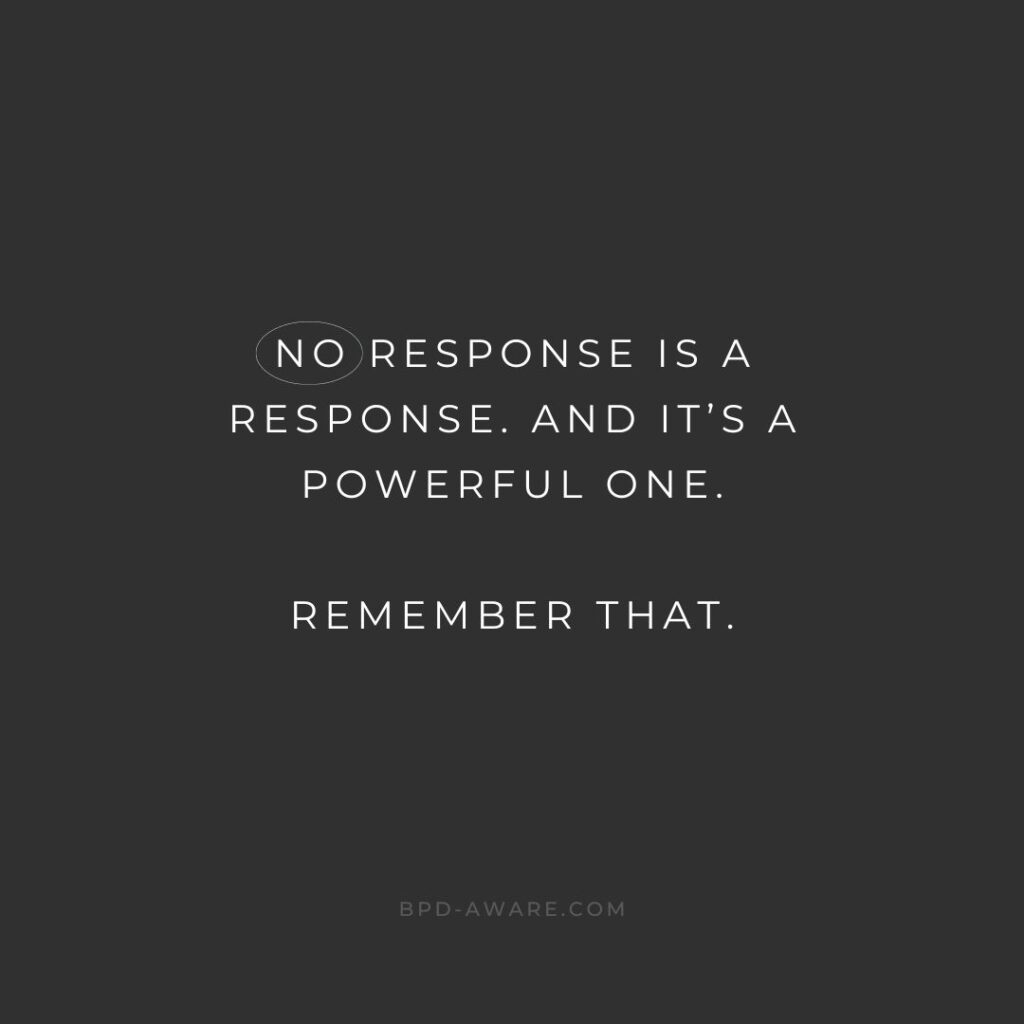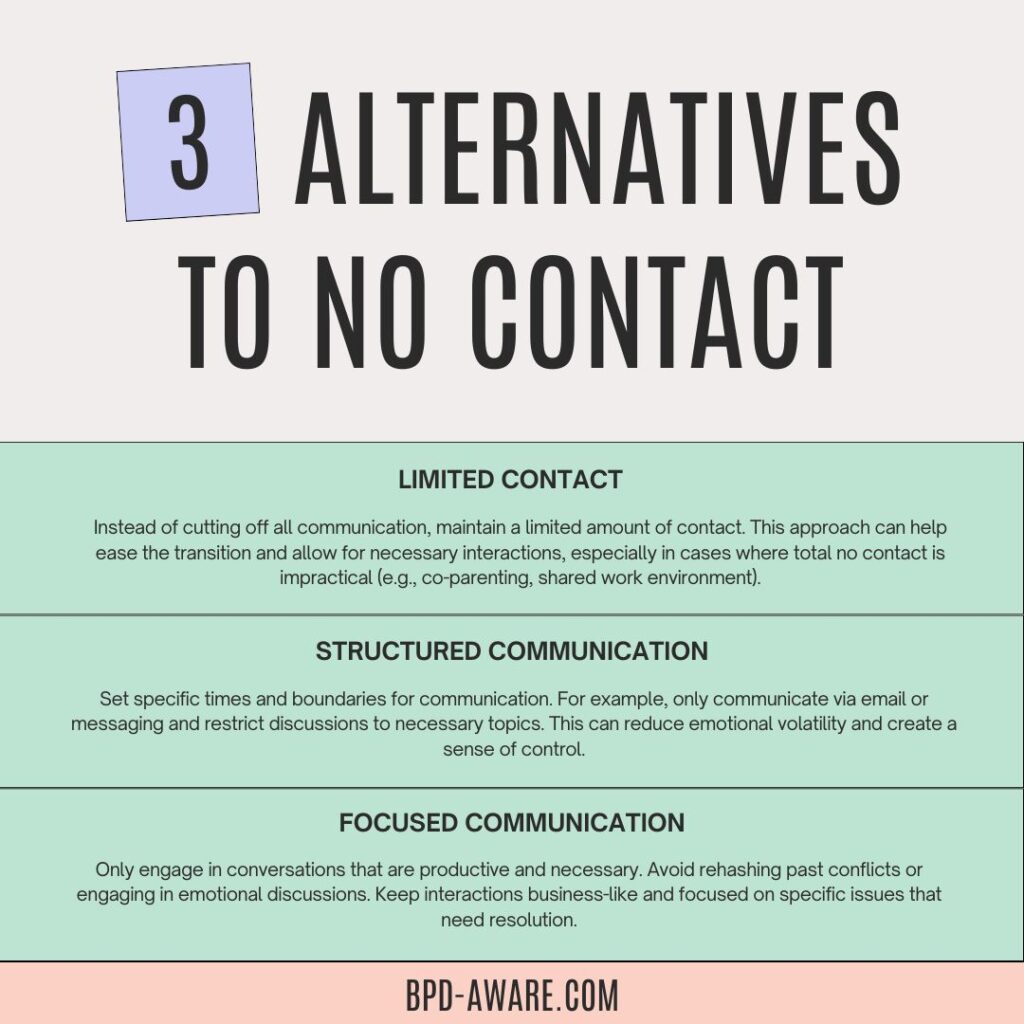When you’re in any kind of relationship with someone who has Borderline Personality Disorder (BPD), there are often many highs and lows to traverse. Even the kindest, most empathetic person can suffer through enough of the lows that they feel like enough is enough.
The decision to have no contact with someone isn’t an easy one to make, especially when they have BPD. There are many nuances to consider. As well as the whens, whys, and hows of going no contact, you also have to consider the impact on yourself, as well as the other person.
No contact doesn’t have to mean the end of a relationship. It can be a time to heal and take time away from a situation that is causing you a great deal of stress. When successful, no contact can help strengthen a relationship.
No contact can also be used as a tool at the end of a relationship to prevent the other party from trying to hoover you back into a toxic situation.
In this article, we will explore the no-contact option through a compassionate lens to both parties. This will include the difference between no contact and ghosting, when going no contact is appropriate, the impact of going no contact on someone with BPD, and how to enact a period of no contact.
No Contact vs Ghosting
No contact and ghosting have some similarities, which is why they can be mistaken for one another. However, they differ significantly in their intent and how they are implemented.
Ghosting refers to abruptly cutting someone off without any prior warning. This typically involves no longer responding to calls or messages and disappearing from the other person’s life without giving them any closure.
The intent of ghosting can vary from person to person. For some, it may be an example of avoidant behavior. They wish to sever a relationship but they avoid that final confrontation where they end the relationship. Ghosting can also be done to remove oneself from an uncomfortable or dangerous situation. At its worst, ghosting can be done to deliberately hurt the other party.
Victims of ghosting often feel hurt and confused. A huge hole has been opened up in their lives without explanation or warning and can cause serious mental wounds that impact future relationships.
Where going no contact typically differs is that the person going no contact will tell the other party that they no longer wish to be in contact with them. Depending on the situation, this could be for a fixed time (like two weeks) or permanent. An unspecified amount of time isn’t recommended as this leaves too much room for doubt and possible negotiation.
The intent of having no contact with someone is to empower the person enacting it. It can allow the enactor time to heal and prioritize themselves for a while. It also allows them time to reflect on the relationship, whether they wish for it to continue, and any changes that need to be made for it to do so.
People who’ve been put on no contact often still feel hurt, they don’t have the confusion and lack of understanding and control over the situation that victims of ghosting do.

The Impact of No Contact On Someone With BPD
The impact on the individual with BPD who’s on the receiving end of no contact can vary from person to person. It can also depend on the nature of the relationship.
At its best, going no contact can help the person with BPD to self-reflect on the behavior that has led to this situation. They may be able to learn that they need to work on certain aspects of themselves if they wish to engage in healthier relationships. In this way, going no contact can be an opportunity for development and growth for the person with BPD.
At its worst, having no contact with someone with BPD can significantly impact their self-esteem, cause feelings of rejection, and cause emotional turbulence and distress. They may attempt to re-establish contact either directly or through a third party.
While it’s important to consider their feelings when considering whether or not to go no contact, you also need to consider your mental health. Your feelings and emotions are just as valid as theirs and you are within your right to enact no contact for your good if you deem it to be necessary.
When Going No Contact Is Appropriate
Deciding to go no contact with someone who has BPD isn’t a decision to be made lightly. Going no contact shouldn’t be used as a punishment for minor incidents. It’s a powerful statement to be made during difficult times as a consequence of serious concerns. Having no contact is often a last resort.
Here are some times when going no contact is appropriate:
When you have safety concerns. If you have real concerns about your physical or mental health due to the actions of the other party, going no contact is a legitimate option.
When they violate your boundaries. If the individual repeatedly violates agreed-upon boundaries in your relationship, a stronger boundary such as no contact can be established.
When you feel like you’re being abused or manipulated. Having no contact when you feel like you’re being abused or manipulated can send a clear message that those negative behaviors need to stop.
When you’re emotionally exhausted. Being in any sort of relationship with someone with BPD can be draining at times. It’s reasonable and valid to require a break.
When they aren’t making progress or taking treatment seriously. If the person with BPD doesn’t appear to be making progress in treatment or is unwilling to seek treatment, you may need to go no contact with them to distance yourself.
When you need to work on yourself. You may have some issues yourself that you need time to work on, or life goals that you want to accomplish. In these situations, going no contact allows you to prioritize yourself.
Going No Contact With Someone Who Has BPD
Going no contact with someone who has BPD will be hard on both of you. You’ll likely feel a sense of guilt for “abandoning” a vulnerable person. As tough as the relationship has been, there are also likely going to be times when you miss talking to them and are tempted to reach out, violating the boundary you have set. You can also expect your loved one to try and contact you, which can be difficult to cope with. This isn’t to say that going no contact isn’t worthwhile, just that it can be very hard to do and follow through on. If you do break an agreed no contact prematurely, that can make you look weak and easy to manipulate – something that will likely do more harm than good for your relationship.
With that being said, here are some important things to consider when having no contact with someone who has BPD.
Establish clear boundaries. Communicate exactly what you mean when you say you’re going no contact with them. Typically this means all forms of communication including in-person, text messages and calls, and any digital communication.
Establish a clear time frame. Let the other party know how much time you need. Try and be as specific as possible but giving a window such as two to four weeks gives you some wiggle room if you find you need more time. If this is the end of a relationship, a permanent no contact is perfectly valid.
Block channels of communication. Once you have told the other person that you are going no contact, it’s okay to block them on your phone and social media. This prevents the possibility of boundary violations and any attempts from them to hoover you back into an active relationship.
Remove reminders of them. Make things easier on yourself by removing reminders of them from your life. Photos and gifts that make you think of them should be hidden away for the time being. You may also want to limit or avoid spending time with mutual friends.
Stay firm and consistent. Resist the urge to respond to any attempts to contact you the other party might make. Likewise, avoid contacting them before the agreed-upon period is over. Remember, you aren’t responsible for their mental health – you’re only responsible for your own.
Practice self-care. Take the time to unwind and relax, something you likely haven’t done a lot of lately. Pamper yourself and engage in some new hobbies, or pick some new ones back up. Be compassionate with yourself.
Set some goals for yourself. A relationship with someone who has BPD can be so intense that you completely lose yourself in it. Remind yourself who you are and remember those things that you always wanted to do. Consider how you might go about achieving these goals.
Seek support. Lean on friends, family members, or a local support group for help during this challenging time. You may also want to consider attending therapy or counseling for professional advice on processing your emotions, implementing no contact, and rediscovering what you want out of life.
Get the law involved. If your boundaries are still being ignored after going no contact, it’s time to get the law involved. Document any attempts of contact, especially if they are abusive. Having evidence to show the police – and potentially a judge – can be of great help.
Implementing no contact can be draining in and of itself. It’s a whole new challenge, one that most of us aren’t used to. Ultimately, it’s a step to reclaiming control over your life and prioritizing your well-being.

Final Thoughts
Navigating the decision to go no contact with someone who has BPD is tricky and requires a great deal of thought to process and implement. By deciding to go no contact, you are choosing to protect yourself against abusive behavior and/or a relationship that has pushed you to the brink. You are not punishing the other party, you are giving yourself autonomy and the space you need to heal.
You may feel a sense of guilt or even shame for having no contact with someone with BPD, but remember that it is their behavior that necessitated the break. Treat yourself with the kindness and compassion that you have likely shown them countless times before.
Sometimes going no contact can be a catalyst for the other party to make the changes they need to begin or continue the recovery process. This is the ideal outcome. However, sometimes it can show that the relationship needs to be dissolved for the sake of one or both individuals.
Sources, Resources, and Further Reading
- What Is a No-Contact Rule Breakup? I Asked a Therapist to Explain: https://www.purewow.com/wellness/no-contact-rule-explained
- A Psychologist Weighs In On The Post-Breakup ‘No-Contact’ Rule: https://www.forbes.com/sites/traversmark/2024/01/26/a-psychologist-weighs-in-on-the-post-breakup-no-contact-rule/
- The No Contact Rule: What it Is & When to Use it: https://www.choosingtherapy.com/no-contact-rule/
- How to Go “No Contact”: https://psychcentral.com/health/didactic-memory#recap
- No Contact: The Right Way & The Wrong Way: https://www.bpdfamily.com/content/no-contact-right-way-wrong-way
















